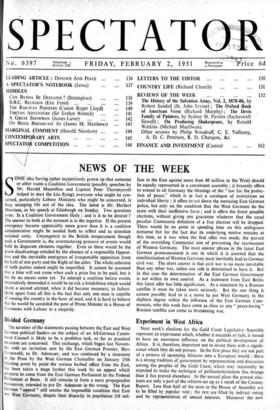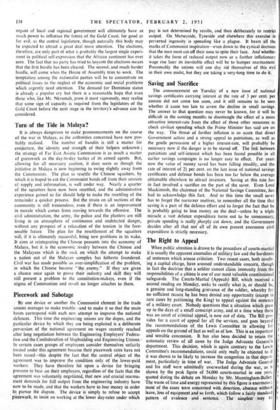Experiment in West Africa
Next week's elections for the Gold Coast Legislative Assembly represent an experiment which, whether it succeeds or fails, is bound to have an enormous influence on the political development of Africa. It is, therefore, important not to invest them with a signifi- cance which they do not possess. In the first place they arc not part of a process of squeezing Africans into a European mould ; there is a strong tradition of government by representation and discussion among the peoples of the Gold Coast, which may reasonably be expected to make the technique of parliamentarianism less strange than it has proved elsewhere. In the second place the present elec- tions are only a part of the reforms set up as a result of the Coussey Report. Less than half of the seats in the House of Assembly are to be filled by popular vote ; the rest are filled by indirect voting and by representatives of special interests. Moreover the new
organs of local and regional government will ultimately have as much power to influence the future of the Gold Coast, for good or for evil, as the central legislature, though naturally this body may be expected to attract a great deal more attention. The elections, therefore, are only part of what is probably the largest single experi- ment in political self-expression that the African continent has ever seen. The fact that no party has tried to boycott the elections means that the first hurdle has been cleared. The second, and much harder hurdle, will come when the House of Assembly tries to work. The temptation among the nationalist parties will be to concentrate on political issues to the neglect of the economic and social problems which urgently need attention. The demand for Dominion status is already a popular cry but there is a reasonable hope that even those who, like Mr. Nkrumah, press it most vigorously, may realise that some sign of capacity .is required from the legislators of the Gold Coast before the next stage in the territory's advance can be considered.



































 Previous page
Previous page